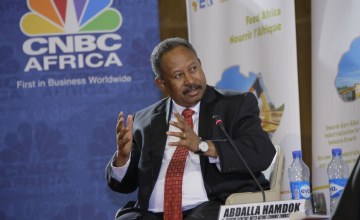Abdalla Hamdok, Acting ECA Executive Secretary, has called for new policy approaches to incentivize agricultural production in activities and sectors with higher returns, so that Africa can yield benefits from commodity-based industrialization and agro-alliance.
"Our desire for structural transformation will not be realized without strong and inclusive institutions that are backed by well-coordinated development plans and supported by innovative and flexible industrial policy mechanisms," stressed Mr. Hamdok in his remarks at the opening of the African Economic Conference themed, Feeding Africa: Towards Agro-Allied Industrialization for Inclusive Growth.
The Economic Commission for Africa has on many editions of its annual Economic Report made a push for the Developmental State and a return to planning, arguing that the strong role of the State is key to fostering Africa's structural transformation. As the Continent is endowed with natural resources, opportunities abound to promote industrialization, agro-allied and commodity-based industrialization, as well as export diversification through dynamic industrial policies.
Mr. Hamdok outlined that agro-allied industries will require, "targeting local content measures with specific emphasis on skills development, technological capabilities and access to capital and markets, as well as cooperation between buyers and suppliers at every stage of the value chain."
Nigeria's Vice-President Osinbajo, who spoke on behalf of President Muhammadu Buhari, disclosed numerous efforts being made by the Government to support agriculture and its value chains to diversify and transform the economy in the absence of oil resources, which formed the backbone of the economy.
He expressed the hope that the conference would come up with evidence-based research and knowledge of good practices that can help Nigeria and other African countries to transform their agricultural production for more sustainable growth.
African Development Bank President, Akinwumi Adesina, reminded participants that Nigeria was chosen to host the conference largely because of its enormous potential in agriculture, which, if well harnessed has the potential to become a global powerhouse through agro-industrialization.
Agriculture, said Adesina, contributes over 28% of the GDP of Africa and holds the key for accelerated growth and diversification and job creation for African economies.
UN Assistant Secretary General and Director of UNDP Regional Bureau for Africa, Abdoulaye Mar Dieye, urged African governments to work together with their bilateral and multilateral partners to support the continent's agro-allied industrialization agenda. Speaking to Africa's agricultural potential, M. Dieye said: "Agriculture can be the golden gate to Africa's prosperity; it is the high octane oil that, if properly processed, can radically transform the continent."
For his part, Eric Maskin of Harvard University and co-recipient of the 2007 Nobel Prize in economics made a short presentation on why globalization is accelerating inequality instead of reducing it. Maskin called for greater skills education and training, to provide people usually in rural agricultural areas with requisite skill that would enable them get jobs in agro-industry establishments.
The African Economic Conference is co-organized by the African Development Bank, the Economic Commission for Africa and the UN Development Programme. Over 300 researchers and representatives from international institutions are in attendance.
For more information on the African Economic Conference, please visit: www.afdb.org/aec
Official hashtags: #AEC2016 #FeedAfrica
Follow us on Twitter: @ECA_OFFICIAL @AfDB_Group @UNDPAfrica @UNDPNigeria


